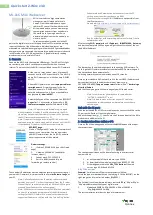
110
www.analogway.com
USER MANUAL
USER MANUAL
USER MANUAL
USER MANUAL
USER MANUAL
USER MANUAL
USER MANUAL
USER MANUAL
1 0
Program a Show - Cue
Fig. 92 -
Cues panel
In the
Cue
menu, create presets of
Layers
(with their parameters) and order them with
timing
settings. A cue
holds visual and non-visual information about the state of one or more layers. A cue is a preset with layers
settings to create a specific view on the displays. For example, cues can change layer position or change a
playback state. Cues are organized in
Cue Stacks
.
10.1
Presentation
10.1.1
How cues work
By default, the
Recording
button in the Cue tab is enabled and any modification in the
Layers tab
is marked
in Green, which indicates that it is recorded in the programmer. The programmer records the last assigned
value for a parameter (not always the default parameter value). It is possible to record unchanged or default
values into a programmer manually. When the desired parameters are recorded in the programmer the
programmer content can be saved to a new cue or added to an existing cue.
When running a cue the change in the server state depends on difference between the output from the
previous cue and the current cue. A parameter only changes if it is defined in the cue.
Cue
Parameter 1
Parameter 2
Parameter 3
Call Cue 1
10
20
30
Call Cue 2
20
no change (keep 20)
35
Call Cue 3
no change (keep 20)
25
40
Call Cue 2
20
no change (keep 25)
35
Table 8 -
Cue logic example
In the example above, parameter 2 remains at value 20 when cue 3 is played after cue 2, because no change
is recorded for it. And parameter 2 remains at value 25 when cue 2 is played after cue 3.
10.1.2
Timings (Wait, Fade and Hold)
A cue is associated with timing settings: Wait, Fade and Hold.
-
Wait
–
Time before executing the content
-
Fade
–
Time of the execution of the content
-
Hold
–
Time before the next Cue (for
Automatic
trigger)
















































